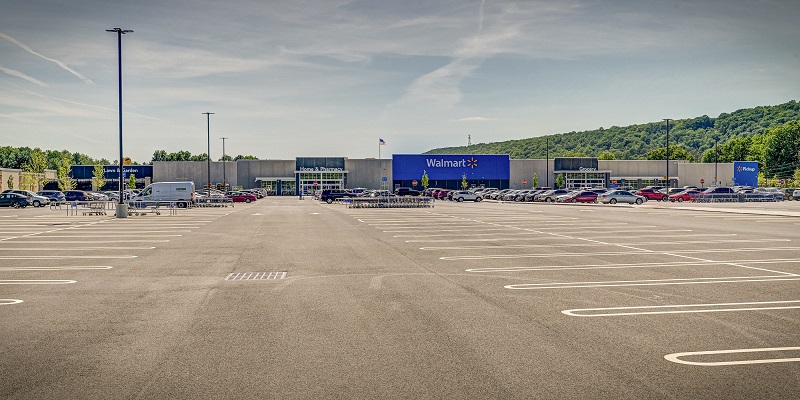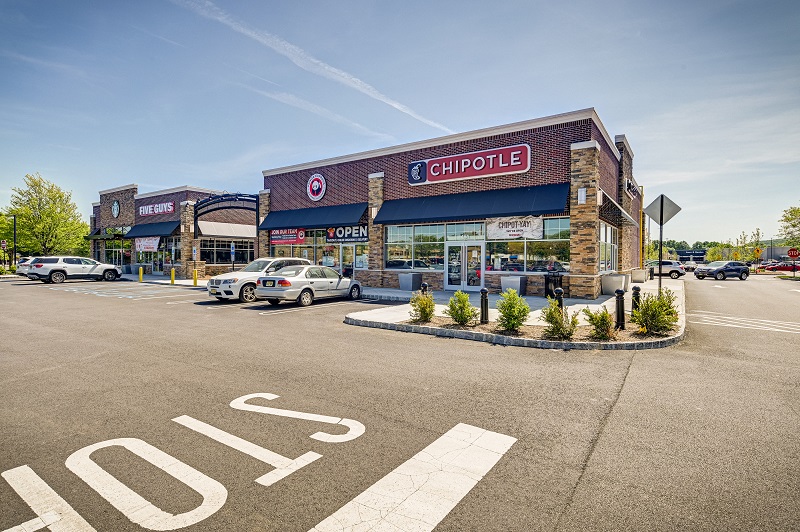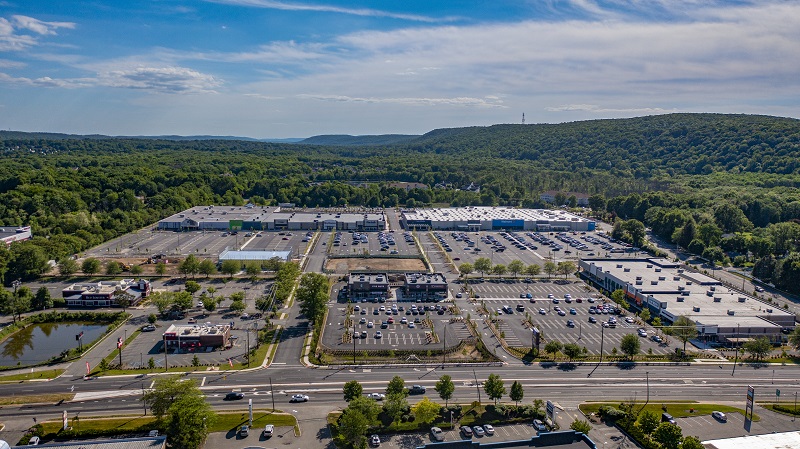A joint venture led by Advance Realty Investors has transformed the former Ledgewood Mall in Roxbury from a previously enclosed property to a 450,000-square-foot, open-air shopping center with separate entrances to stores and a centralized parking lot — all of it anchored by a 164,087-square-foot Walmart Supercenter. – Courtesy: Ledgewood Investors LLC
By Marlaina Cockcroft
“The future of retail” is now on display at the revamped Shops at Ledgewood Commons in Roxbury, according to Daniel Cocoziello of Advance Realty Investors.

The former Ledgewood Mall, built in 1972, has undergone a complete “de-malling,” changing the enclosed space to a 450,000-square-foot, open-air shopping center with separate entrances to stores and a centralized parking lot — all of it anchored by a 164,087-square-foot Walmart Supercenter that opened last October.
“We’ve taken a larger, continuous structure and broken it down into different components,” said Cocoziello, principal and managing director of development at Bedminster-based Advance Realty. “In our opinion, it’s the future of retail. There’s been a tremendous amount of foot traffic and excitement around the center.”
He said the goal at the Roxbury site — a joint venture of Advance Realty and Invesco — is experiential retail, meaning shoppers can buy furniture at Ashley HomeStore, clothing at Burlington and coffee at Starbucks without needing to walk far.
“Once they’re there, you want them to walk around and go to different stores and maybe grab something to eat,” he said.
The key to the concept is getting the right mix of tenants, he said, as well as having the commitment from the surrounding community. De-malling “is a trend that everybody in the United States is looking at,” Cocoziello said.

Rutgers University economics professor James Hughes confirmed that trend, though he added, “One size doesn’t fit all.”
“Within the broad de-malling phenomenon, we’re really seeing market segmentation,” said Hughes, dean emeritus of the Edward J. Bloustein School of Planning and Public Policy. “Some of the really obsolete centers, either physically or with a tenant mix that doesn’t really reflect new lifestyles and the like, are doomed, and those are going to be replaced by fulfillment centers or last-mile delivery stations or housing. … Even within the new e-commerce world, there is some desire for some shopping facilities, experiential facilities and the like. That won’t completely disappear. So there’ll be some winners that survive in the new world, and this may be one of them.”
Hughes said the experiential concept, emphasizing what he called the “triple F” of food, fitness and fun, is replacing traditional shoe and clothing stores. “And that was a strategy, really, that unfolded the last four, five years,” he said. One big example is the massive American Dream complex in East Rutherford, which went from mostly retail to about 60 percent experiential by the time the facility began to open in 2019.
He noted that Ledgewood Commons’ offerings fit well with nearby stores, in particular citing Home Depot, in the adjacent Roxbury Mall, as a complement to Walmart.
“Walmart is a very, very strong draw,” Hughes said. “It has flourished during COVID-19. So that’s a strong baseline.”

The Walmart previously at the site was expanded by 90,000 square feet last year to become a freestanding Walmart Supercenter. The existing Marshalls has been moved to a more prominent location, along with new retailers Burlington, Ulta Beauty, Five Below and DSW and previous tenant Ashley Furniture. New food options at the front of the site include Starbucks, Five Guys, Panda Express and Chipotle Mexican Grill.
A spot had been planned for Barnes & Noble until the bookstore chain announced it would be permanently closing that location. Cocoziello said there are a couple of possibilities for the space. It was a loss, but long-term, “some tremendous options are out there.”
Walmart, which offers a garden center, pharmacy, vision services and groceries, was “great to work with in terms of moving a plan forward,” as was the township, Cocoziello said. He said it was important to have the store “open up and be developed in the middle of this pandemic and have it be positioned going forward coming out of the pandemic as a tremendous amenity, not only in Ledgewood but in Roxbury Township.”

Having the Walmart is a “home run” for Ledgewood Commons, said Gary Albrecht, co-chair of the real estate department at law firm Cole Schotz PC in Hackensack. His firm didn’t work on the project but has been involved in other, smaller-scale redevelopments in New Jersey and other states.
He said the Ledgewood project is a more complete de-malling than he’s seen at other sites, which generally revamp the interior. For instance, Cole Schotz worked on the updating of the Bergen Town Center in Paramus, which added restaurants and middle-market retailers to the “classic old mall,” Albrecht said.
Other malls in the area have changed as well, he said. Paramus Park Mall changed its traditional retail mix by adding a Stew Leonard’s, and the planned redevelopment of Westfield Garden State Plaza in Paramus includes a residential element as a “hedge for the retail risk” and to provide customers.
Albrecht finds the Ledgewood project interesting for several reasons, including “the fact that they went from, essentially, retail to retail, because a lot of what we’ve seen has been retail to mixed-use.” The old Ledgewood Mall was “like a who’s who of department stores and bigger boxes that have gone down,” such as W.T. Grant, Rickel, Jamesway and Stern’s.
“They moved from a department store-based, enclosed mall, which was pretty unsightly, to really transforming it to something that serves that market,” including discount clothing retailers, middle-market furniture and quick-serve food options.
“It seems like a really solid, internet-resistant concept,” Albrecht said.

It likely helped that the project, which featured March Associates Construction as its construction manager, was granted an exception to Gov. Phil Murphy’s pandemic shutdown of nonessential construction. That prevented cost issues due to delays, he said. Backing from the community was important as well: “It sounds like Roxbury was in favor of the project, which is huge,” he added.
And because the project is a joint venture, that eases the financial risk. Albrecht said he’s seen instances where an owner started redeveloping a property and realized it needed to bring in another party to take on some of the financial load.
Cocoziello, of Advance Realty, said the mall had had multiple vacancies when the firm took over, and Ledgewood Commons now offers more tenants than before. He estimated that the site is 95 percent occupied. Construction is still underway on the freestanding spaces in front, but the main part of the center is operational. The remaining work is expected to be completed by September, he said.
Renovating an existing retail site in this way is a good bet, Hughes said, especially since it’s easier to upgrade an older property than to build a new facility in a green field, which risks opposition.
He said the pandemic has accelerated the de-malling trend, calling it “gasoline on the fire” of the bricks-and-mortar meltdown. Changes that might have happened three or four years from now have instead happened in less than a year.
“The future arrived much sooner than we thought it would,” he said.
The trend will continue, Hughes said, because “America was over-stored. And New Jersey was certainly more over-stored than the nation.” At its peak, New Jersey had 29 enclosed super-regional malls, “but that reflected lifestyles in the 1980s. And so that has been substantially contracted, and it’s going to continue to contract.” There will always be some need for physical retail, Hughes said.
Advance Realty and its partners think they’re filling that need. Cocoziello said they’re finalizing the last couple of leases on Ledgewood Commons.
“It’s transformed, and we’re very proud of what it looks like today,” he said.










